初中英语语法-一般将来时经典版(附答案)
(完整版)一般将来时态讲解及练习和答案
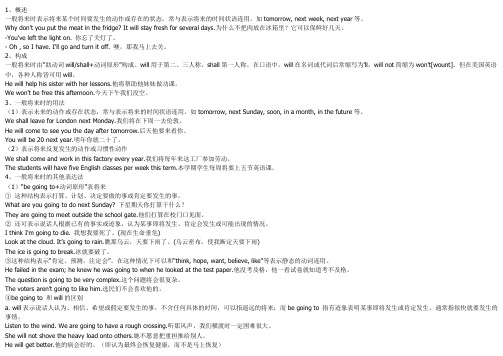
1、概述一般将来时表示将来某个时间要发生的动作或存在的状态,常与表示将来的时间状语连用,如tomorrow, next week, next year等。
Why don’t you put the meat in the fridge? It will stay fresh for several days.为什么不把肉放在冰箱里?它可以保鲜好几天。
-You've left the light on. 你忘了关灯了。
- Oh , so I have. I'll go and turn it off. 噢,那我马上去关。
2、构成一般将来时由“助动词will/shall+动词原形”构成。
will用于第二、三人称,shall第一人称。
在口语中,will在名词或代词后常缩写为'll,will not简缩为won’t[wount]。
但在美国英语中,各种人称皆可用will。
He will help his sister with her lessons.他将帮助他妹妹做功课。
We won't be free this afternoon.今天下午我们没空。
3、一般将来时的用法(1)表示未来的动作或存在状态,常与表示将来的时间状语连用,如tomorrow, next Sunday, soon, in a month, in the future等。
We shall leave for London next Monday.我们将在下周一去伦敦。
He will come to see you the day after tomorrow.后天他要来看你。
You will be 20 next year.明年你就二十了。
(2)表示将来反复发生的动作或习惯性动作We shall come and work in this factory every year.我们将每年来这工厂参加劳动。
【英语】 中考英语一般将来时20篇(附带答案解析)
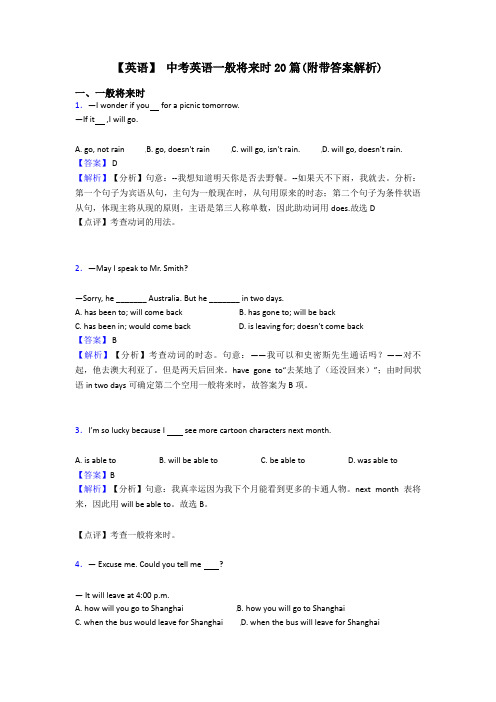
【英语】中考英语一般将来时20篇(附带答案解析)一、一般将来时1.—I wonder if you for a picnic tomorrow.—If it ,I will go.A. go, not rainB. go, doesn't rainC. will go, isn't rain.D. will go, doesn't rain.【答案】 D【解析】【分析】句意:--我想知道明天你是否去野餐。
--如果天不下雨,我就去。
分析:第一个句子为宾语从句,主句为一般现在时,从句用原来的时态;第二个句子为条件状语从句,体现主将从现的原则,主语是第三人称单数,因此助动词用does.故选D【点评】考查动词的用法。
2.—May I speak to Mr. Smith?—Sorry, he _______ Australia. But he _______ in two days.A. has been to; will come backB. has gone to; will be backC. has been in; would come backD. is leaving for; doesn't come back【答案】 B【解析】【分析】考查动词的时态。
句意:——我可以和史密斯先生通话吗?——对不起,他去澳大利亚了。
但是两天后回来。
have gone to“去某地了(还没回来)”;由时间状语in two days可确定第二个空用一般将来时,故答案为B项。
3.I’m so lucky because I see more cartoon characters next month.A. is able toB. will be able toC. be able toD. was able to【答案】B【解析】【分析】句意:我真幸运因为我下个月能看到更多的卡通人物。
初中英语语法-一般将来时练习题(含答案)

初中英语语法-一般将来时练习题(含答案)1.There will XXX.2.Charlie won't work here next month.3.He is very busy this week。
but he will be free next week.4.There will be a dolphin show in the XXX.5.Are you going to be free tomorrow。
No。
I will be free the day after tomorrow.6.Mother will give me a nice present on my next birthday.7.No。
please don't.8.I will get it for you at once。
1.明天下午将举行一次会议。
2.XXX下个月不会在这里工作。
3.他这周很忙,但下周会有空。
4.明天晚上动物园会有一场海豚表演。
5.你明天会有空吗?不,我后天会有空。
6.我的母亲会在我下一个生日给我一个好礼物。
7.不,请不要。
8.我会立刻拿给你。
9.XXX Saturday?10.If they show up。
we will hold a meeting.11.He will give her a beautiful hat on her next birthday.12.He will write to us as soon as he arrives there.13.He will come back in three days.14.If it doesn't rain tomorrow。
we'll go roller-skating.15.No。
they won't.16.Who will we go XXX?17.We will XXX.18.Tomorrow。
一般将来时讲解及练习(含答案)
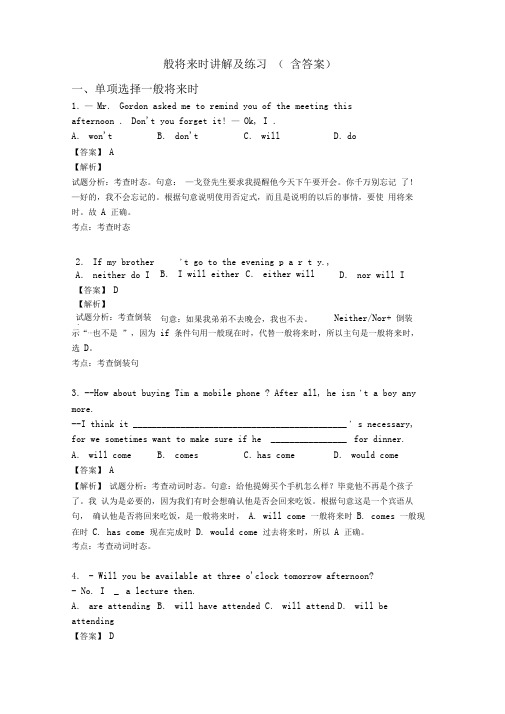
般将来时讲解及练习(含答案)一、单项选择一般将来时1.—Mr.Gordon asked me to remind you of the meeting thisafternoon .Don't you forget it! —Ok, I .A.won't B.don't C.will D.do【答案】A【解析】试题分析:考查时态。
句意:—戈登先生要求我提醒他今天下午要开会。
你千万别忘记了!—好的,我不会忘记的。
根据句意说明使用否定式,而且是说明的以后的事情,要使用将来时。
故A 正确。
考点:考查时态2.If my brother doesn 't go to the evening p a r t y.,A.neither do I B.I will either C.either willI D.nor will I【答案】D 【解析】试题分析:考查倒装句:句意:如果我弟弟不去晚会,我也不去。
Neither/Nor+ 倒装句,表示“⋯也不是”,因为if 条件句用一般现在时,代替一般将来时,所以主句是一般将来时,选D。
考点:考查倒装句3.--How about buying Tim a mobile phone ? After all, he isn 't a boy any more.--I think it _____________________________________________ ' s necessary, for we sometimes want to make sure if he ________________ for dinner. A.will come B.comes C.has come D.would come【答案】A【解析】试题分析:考查动词时态。
句意:给他提姆买个手机怎么样?毕竟他不再是个孩子了。
我认为是必要的,因为我们有时会想确认他是否会回来吃饭。
中考英语专题讲练: 一般将来时(含解析)
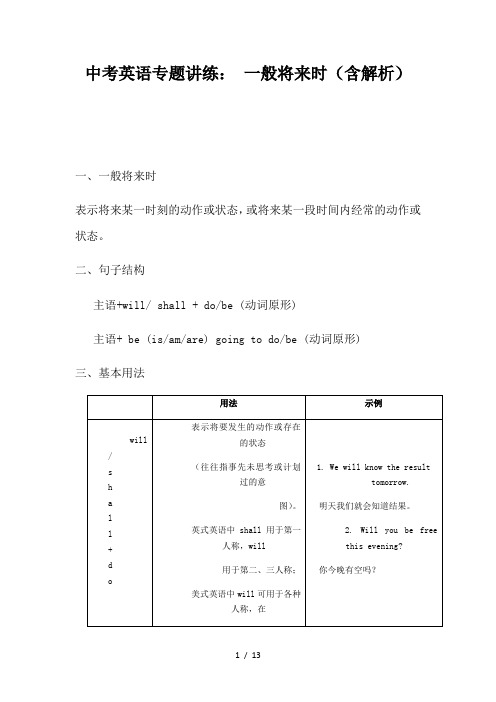
6. in (the) future将来、未来
五、相关句式
will do
be going to do
肯定式
主语+ will do…
主语+ be going to do…
否定式
主语+ will + not + do…
主语+ be + not + going to do…
疑问式
Will +主语+do…?
中考英语专题讲练:一般将来时(含解析)
一、一般将来时
表示将来某一时刻的动作或状态,或将来某一段时间内经常的动作或状态。
二、句子结构
主语+will/ shall + do/be (动词原形)
主语+ be (is/am/are) going to do/be (动词原形)
三、基本用法
用法
示例
will/shall+do
例1.1.3If they come, we _________ a meeting.
A.will have
B.have
C.had
D.would have
题模二:句型转换
例1.2.1I’ll go and join them.(改为否定句)
____________________________________
例:The train leaves at six tomorrow morning.火车明天上午六点开。
When does the bus star? It stars in ten minutes.汽车什么时候开?十分钟后。
2). if引导的条件状语从句,主句用一般将来时,从句用一般现在时表将来。
一般将来时语法规则及练习题(附答案)
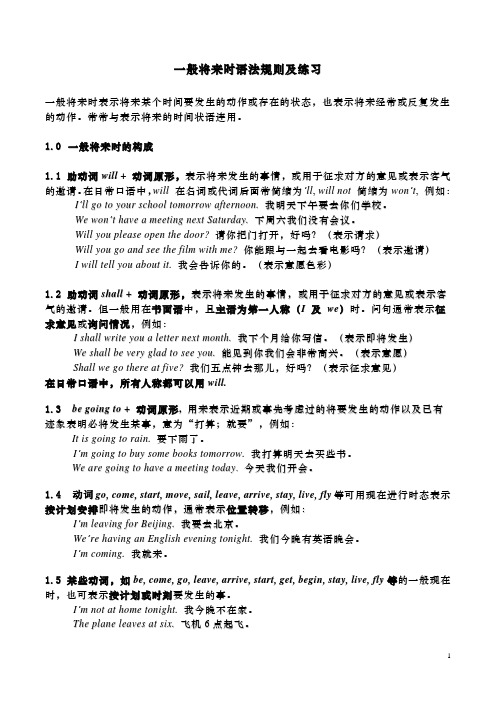
一般将来时语法规则及练习一般将来时表示将来某个时间要发生的动作或存在的状态,也表示将来经常或反复发生的动作。
常常与表示将来的时间状语连用。
1.0一般将来时的构成1.1助动词w i l l+动词原形,表示将来发生的事情,或用于征求对方的意见或表示客气的邀请。
在日常口语中,w i l l在名词或代词后面常简缩为’l l,w i l l n o t简缩为w o n’t,例如:I’l l g o t o y o u r s c h o o l t o m o r r o w a f t e r n o o n.我明天下午要去你们学校。
W e w o n’t h a v e a m e e t i n g n e x t S a t u r d a y.下周六我们没有会议。
W i l l y o u p l e a s e o p e n t h e d o o r?请你把门打开,好吗?(表示请求)W i l l y o u g o a n d s e e t h e f i l m w i t h m e?你能跟与一起去看电影吗?(表示邀请)I w i l l t e l l y o u a b o u t i t.我会告诉你的。
(表示意愿色彩)1.2助动词s h a l l+动词原形,表示将来发生的事情,或用于征求对方的意见或表示客气的邀请。
但一般用在书面语中,且主语为第一人称(I及w e)时。
问句通常表示征求意见或询问情况,例如:I s h a l l w r i t e y o u a l e t t e r n e x t m o n t h.我下个月给你写信。
(表示即将发生)W e s h a l l b e v e r y g l a d t o s e e y o u.能见到你我们会非常高兴。
(表示意愿)S h a l l w e g o t h e r e a t f i v e?我们五点钟去那儿,好吗?(表示征求意见)在日常口语中,所有人称都可以用w i l l.1.3b e g o i n g t o+动词原形,用来表示近期或事先考虑过的将要发生的动作以及已有迹象表明必将发生某事,意为“打算;就要”,例如:I t i s g o i n g t o r a i n.要下雨了。
英语一般将来时题20套(带答案)及解析
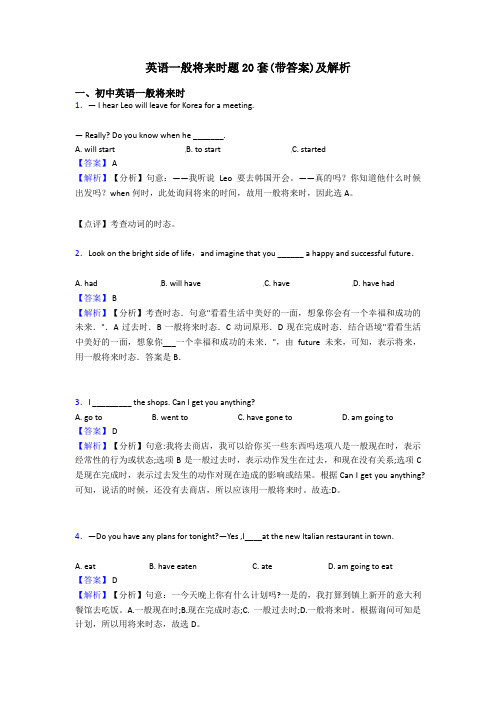
英语一般将来时题20套(带答案)及解析一、初中英语一般将来时1.— I hear Leo will leave for Korea for a meeting.— Really? Do you know when he _______.A. will startB. to startC. started【答案】 A【解析】【分析】句意:——我听说Leo要去韩国开会。
——真的吗?你知道他什么时候出发吗?when何时,此处询问将来的时间,故用一般将来时,因此选A。
【点评】考查动词的时态。
2.Look on the bright side of life,and imagine that you ______ a happy and successful future.A. hadB. will haveC. haveD. have had【答案】 B【解析】【分析】考查时态.句意"看看生活中美好的一面,想象你会有一个幸福和成功的未来.".A过去时.B一般将来时态.C动词原形.D现在完成时态.结合语境"看看生活中美好的一面,想象你___一个幸福和成功的未来.",由future未来,可知,表示将来,用一般将来时态.答案是B.3.I _________ the shops. Can I get you anything?A. go toB. went toC. have gone toD. am going to【答案】 D【解析】【分析】句意:我将去商店,我可以给你买一些东西吗迭项八是一般现在时,表示经常性的行为或状态;选项B是一般过去时,表示动作发生在过去,和现在没有关系;选项C 是现在完成时,表示过去发生的动作对现在造成的影响或结果。
根据Can I get you anything?可知,说话的时候,还没有去商店,所以应该用一般将来时。
故选:D。
4.—Do you have any plans for tonight?—Yes ,I____at the new Italian restaurant in town.A. eatB. have eatenC. ateD. am going to eat【答案】 D【解析】【分析】句意:一今天晚上你有什么计划吗?一是的,我打算到镇上新开的意大利餐馆去吃饭。
(英语)初中英语语法 一般将来时练习题含答案

初中英语:一般将来时专项练习题1.My book ___________ here in two days through the EMS.A.are sent B.is sent C.will be sent D.will send 【答案】C【解析】【详解】句意:两天后,我的书将通过特快专递被寄送到这里。
根据in two days可知此处用一般将来时,结合句意,主语my book与谓语send 之间是被动语态,故此处用一般将来时的被动语态,故选C。
2.—What will you do with the old newspapers?—The old newspapers as well as the old books to the recycling company.A.is going to send B.are going to sendC.is going to be sent D.are going to be sent【答案】D【解析】【详解】试题分析:句意:-你将怎样处理旧报纸?-旧报纸和旧书都将送到回收公司。
newspapers 和 books都是send这一动作的承受者,该用被动语态,而被动语态是由“be + 实意动词的过去分词”构成,newspapers是复数名词,所以选D。
考点:考查被动语态。
3.The school music festival ________ next Friday and I have already prepared for it.A.was held B.is held C.will be held D.have been held【答案】C【解析】【详解】句意:学校音乐节在下周五举行,我已经准备好了。
考查一般将来时的被动语态。
was held一般过去时的被动语态;is held一般现在时的被动语态;will be held一般将来时的被动语态;have been held现在完成时的被动语态。
(语法)初中英语语法 一般将来时练习题含答案

初中英语:一般将来时专项练习题1.(广东省2017年初中毕业生学业考试模拟)It’s reported that Hong Kong-Zhuhai-Macao Bridge ______________ in 2017. A.builds B.is built C.will be built D.will build 【答案】C【解析】【详解】句意:据报道香港——珠海——澳门的大桥将于2017年被建成。
A. builds 一般现在时;B. is built一般现在时的被动语态;C. will be built 一般将来时的被动语态;D. will build一般将来时。
大桥是由人建成的,故用被动语态,根据in 2017可知此处表示一般将来时,结合句意大桥将被建成,故用一般将来时的被动语态,故选C。
2. The old temple ________ next year.A.was rebuilt B.is rebuilt C.will be rebuilt【答案】C【解析】【详解】试题分析:句意:这古老的寺院明年将要被重修。
此题考查一般将来时的被动语态,故选C。
考点:考查一般将来时的被动语态。
3.It's said that zongzi __to students for free in our dining hall on the Dragon Boat Festival next week.A.offer B.have offered C.are offered D.will be offered【答案】D【解析】【详解】句意:据说粽子将在下周端午节在我们的食堂免费送给学生。
考查将来时的被动语态。
根据next week“下周”,可知本句为一般将来时,主语zongzi是动作offer的承受者,因此本句应该用被动语态,将来时的被动语态:will +be+done,故选D。
4.A new airport _________ here. The local government hopes to finish it next year.A.is built B.was built C.has been built D.will be built 【答案】D【解析】【详解】句意:这儿将会建一座新的机场。
一般将来时讲解(附习题+答案)

一般将来时讲解(附习题+答案)一、一般将来时的含义:表示动作发生在将来二、一般将来时的句型:(1) will/shall+动词原形(2) be going to+动词原形三、一般将来时的时间状语:tomorrow(明天)、the day after tomorrow(后天)、next...(下一...): next week(下一周)、next year(明年)、next month(下个月)in+一段时间(...之后): in three days(三天之后)、in the future在未来this evening(今天晚上)四、一般将来时的句型结构:(1) will/shall+动词原形(will not =won’t)(will 各种人称均可用,shall 只能用于第一人称)1)肯定句:主语+will/shall+动词原型...如:I will go to school tomorrow.我明天将会去学校He will go to school tomorrow.他明天将会去学校。
2)否定句:主语+will/shall+not+动词原型...如:I won’t go to school tomorrow.我明天将不会去学校。
He won’t go to school tomorrow.他明天将不会去学校。
3)一般疑问句:Will/Shall +主语+动词原型...如:Will you go to school tomorrow?你明天要去学校吗?Will he go to school tomorrow?他明天要去学校吗?肯定回答:Yes, 主语+will.如:Yes, I will.Yes, he will.否定回答:No,主语+will+not.如:No, I won’t.No, he won’t.4) 特殊疑问句:特殊疑问词+will/shall+主语+动词原型...如:What will you do tomorrow?你明天将会做什么?What will he do tomorrow?他明天将会做什么?(2) be going to+动词原形1)肯定句:主语+be going to +动词原型...如:I am going to buy some books tomorrow.我明天打算去买一些书。
英语一般将来时专题(含答案)含答案解析百度文库
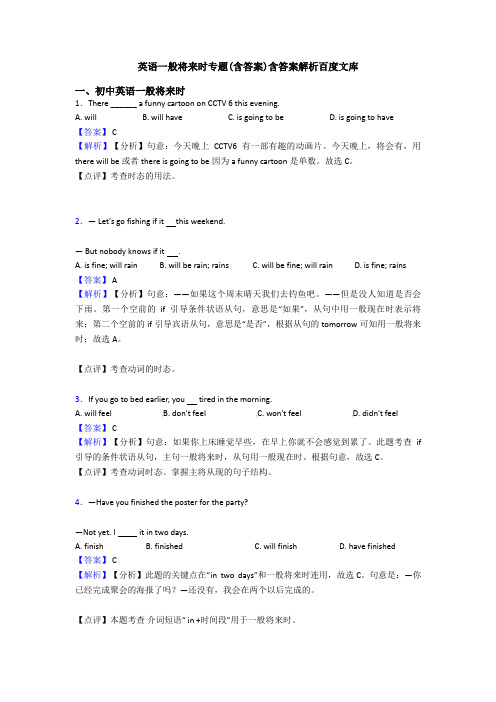
英语一般将来时专题(含答案)含答案解析百度文库一、初中英语一般将来时1.There ______ a funny cartoon on CCTV 6 this evening.A. willB. will haveC. is going to beD. is going to have【答案】 C【解析】【分析】句意:今天晚上CCTV6有一部有趣的动画片。
今天晚上,将会有,用there will be 或者there is going to be因为a funny cartoon是单数。
故选C。
【点评】考查时态的用法。
2.— Let's go fishing if it this weekend.— But nobody knows if it .A. is fine; will rainB. will be rain; rainsC. will be fine; will rainD. is fine; rains 【答案】 A【解析】【分析】句意:——如果这个周末晴天我们去钓鱼吧。
——但是没人知道是否会下雨。
第一个空前的if引导条件状语从句,意思是“如果”,从句中用一般现在时表示将来;第二个空前的if引导宾语从句,意思是“是否”,根据从句的tomorrow可知用一般将来时;故选A。
【点评】考查动词的时态。
3.If you go to bed earlier, you tired in the morning.A. will feelB. don't feelC. won't feelD. didn't feel【答案】 C【解析】【分析】句意:如果你上床睡觉早些,在早上你就不会感觉到累了。
此题考查if 引导的条件状语从句,主句一般将来时,从句用一般现在时。
根据句意,故选C。
【点评】考查动词时态。
掌握主将从现的句子结构。
4.—Have you finished the poster for the party?—Not yet. I it in two days.A. finishB. finishedC. will finishD. have finished【答案】 C【解析】【分析】此题的关键点在“in two days”和一般将来时连用,故选C。
初中一般将来时练习题及答案

初中一般将来时练习题及答案一、动词的一般将来时形式:情态动词will/shall + 动词原形1. I (watch) a movie tonight.2. They (visit) their grandparents tomorrow.3. She (do) her homework after dinner.4. We (go) hiking this weekend.5. He (play) basketball with his friends next Sunday.6. The dog (bark) when it sees strangers.7. The students (have) a test next Monday.8. My parents (travel) to Japan next month.9. We (meet) at the park at 5 o'clock.10. Sarah (read) a book in the library this evening.答案:1. will watch2. will visit3. will do4. will go5. will play6. will bark7. will have8. will travel9. will meet10. will read二、用所给的动词的适当形式填空(有些已经给出)1. Lucy ______ (not play) computer games after school.2. The students ______ (not have) a holiday next week.3. Sam ______ (not go) swimming tomorrow.4. They ______ (not bring) any food to the party.5. We ______ (not watch) TV tonight.6. ______ she ______ (visit) her grandmother on Sunday?7. ______ you ______ (do) your homework tonight?8. ______ they ______ (travel) to Beijing next month?答案:1. will not play2. will not have3. will not go4. will not bring5. will not watch6. Will; visit7. Will; do8. Will; travel三、选择填空1. We ___________ to the beach this afternoon.A. wentB. will goC. goD. are going2. He ________ exercise every morning.A. will doB. doC. doesD. did3. ________ Alice _______ a party tomorrow?A. Will; haveB. Does; haveC. Did; haveD. Will; has4. I _________ my homework after dinner.A. will finishB. finishedC. finishD. will finished5. They ________ late for school tomorrow.A. areB. wereC. will beD. do答案:1. B2. C3. A4. A5. C四、将下列句子改写成一般将来时1. I go swimming every Sunday.2. We have a test next week.3. They travel to China every summer.4. She plays the piano every day.5. He buys a new car.答案:1. I will go swimming every Sunday.2. We will have a test next week.3. They will travel to China every summer.4. She will play the piano every day.5. He will buy a new car.总结:初中的一般将来时是由情态动词will/shall + 动词原形构成的。
英语一般将来时题20套(带答案)
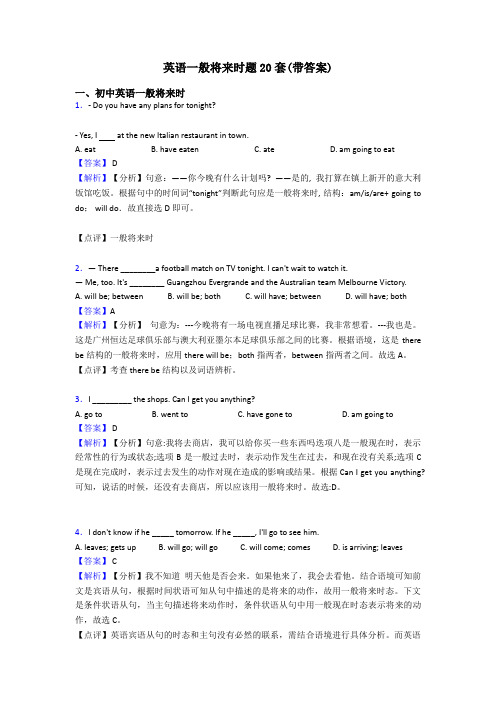
英语一般将来时题20套(带答案)一、初中英语一般将来时1.- Do you have any plans for tonight?- Yes, I at the new Italian restaurant in town.A. eatB. have eatenC. ateD. am going to eat【答案】 D【解析】【分析】句意:——你今晚有什么计划吗? ——是的, 我打算在镇上新开的意大利饭馆吃饭。
根据句中的时间词“tonight”判断此句应是一般将来时, 结构:am/is/are+ going to do; will do.故直接选D即可。
【点评】一般将来时2.— There ________a football match on TV tonight. I can't wait to watch it.— Me, too. It's ________ Guangzhou Evergrande and the Australian team Melbourne Victory.A. will be; betweenB. will be; bothC. will have; betweenD. will have; both【答案】A【解析】【分析】句意为:---今晚将有一场电视直播足球比赛,我非常想看。
---我也是。
这是广州恒达足球俱乐部与澳大利亚墨尔本足球俱乐部之间的比赛。
根据语境,这是there be结构的一般将来时,应用there will be;both指两者,between指两者之间。
故选A。
【点评】考查there be结构以及词语辨析。
3.I _________ the shops. Can I get you anything?A. go toB. went toC. have gone toD. am going to【答案】 D【解析】【分析】句意:我将去商店,我可以给你买一些东西吗迭项八是一般现在时,表示经常性的行为或状态;选项B是一般过去时,表示动作发生在过去,和现在没有关系;选项C 是现在完成时,表示过去发生的动作对现在造成的影响或结果。
一般将来时知识点总结及经典习题(含答案)

14.-- Tommy, do you know if they _____ to the zoo this Sunday if it _____?
-- Sorry, I have no idea.
【点评】考查动词的时态。
15.—Have you finished the poster for the party?
—Not yet. Iit in two days.
A. finish B. finished C. will finish D. have finished
【答案】C
【解析】【分析】此题的关键点在“in two days”和一般将来时连用,故选C。句意是:—你已经完成聚会的海报了吗?—还没有,我会在两个以后完成的。
A. will come; will come B. will come; comes C. comes; will come
【答案】A
【解析】【分析】句意:——你知道怀特太太今晚是否来吃晚饭吗?——不知道。但我认为如果她有空,她会来。空一,句子为含有宾语从句的主从复合句,主句是一般现在时,从句用它所需要的任何时态,根据this evening今晚,可知句子为一般将来时,will come;空二,回答是when引导的时间状语从句,从句是一般现在时,主句应用将来时,will come,故选A。
12.Many scientists believe that robotsable to talk like humans in 50 years.
A. were B. are C. will be D. have been
(精选)初中英语语法 一般将来时练习题含答案

初中英语:一般将来时专项练习题1.【2017湖北省怀化市中考】It's said that a new bridge _______ in my hometown in 2019.A.is built B.was built C.will be built【答案】C【解析】【详解】句意:据说我的家乡将在2019年建一座新桥。
主语a new bridge与动词build之间是被动关系,根据时间状语in 2019可知,句子应该用一般将来时,一般将来时态被动语态的构成为will be done,故答案选C。
2.—Which sport are you in at the school sports meeting?—No decision yet. I think it _______ after discussing it with Mr Zhao. A.was decided B.will be decidedC.will decide D.is decided【答案】B【解析】【详解】试题分析:句意:——校运动会上你参加什么项目?——我还没决定,我想和赵老师商量后再定。
根据句意可知还没和赵老师商量,应该用将来时;另外主语it和动词decide的关系是被动关系,此处要用将来时的被动形式,故选B.考点:考查动词时态。
3.A new car parking ________ near our community in 2020.A.will be built B.will build C.is building D.built【答案】A【解析】【详解】句意:2020年我们社区附近将新建一个停车场。
考查时态和语态。
will be built一般将来时,被动语态;will build一般将来时,主动语态;is building现在进行时,主动语态;built一般过去时,主动语态。
根据时间状语“in 2020”,可知用一般将来时,所以排除CD;根据主语“A new car parking”是谓语动词build的承受者,应该用被动语态,故选A。
一般将来时练习题及答案
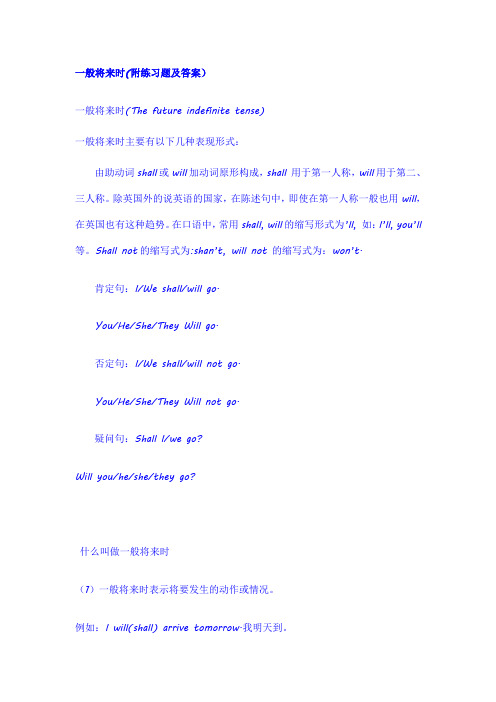
一般将来时(附练习题及答案)一般将来时(The future indefinite tense)一般将来时主要有以下几种表现形式:由助动词shall或will加动词原形构成,shall 用于第一人称,will用于第二、三人称。
除英国外的说英语的国家,在陈述句中,即使在第一人称一般也用will,在英国也有这种趋势。
在口语中,常用shall, will的缩写形式为’ll, 如:I’ll, you’ll 等。
Shall not的缩写式为:shan’t, will not 的缩写式为:won’t.肯定句:I/We shall/will go.You/He/She/They Will go.否定句:I/We shall/will not go.You/He/She/They Will not go.疑问句:Shall I/we go?Will you/he/she/they go?什么叫做一般将来时(1)一般将来时表示将要发生的动作或情况。
例如:I will(shall) arrive tomorrow.我明天到。
Will you be free tonight? 你今晚有空吗?We won’t (shan’t) be busy this evening. 我们今晚不忙。
(2)在一般将来时的句子中,有时有表示将来时间的状语,有时没有时间状语,这时要从意思上判断是否指未来的动作或情况。
例如:Will she come? 她(会)来吗?We’ll only stay for two weeks. 我们只待两星期。
The meeting won’t last long. 会开不了多久。
(3)在以第一人称I或we作主语的问句中,一般使用助动词shall,这时或是征求对方的意见(a),或是询问一个情况(b):a. Where shall we meet? 我们在哪儿碰头?b. Shall we have any classes tomorrow?明天我们有课吗?在这类问句中,近年来也有不少人用will,特别是在美国。
- 1、下载文档前请自行甄别文档内容的完整性,平台不提供额外的编辑、内容补充、找答案等附加服务。
- 2、"仅部分预览"的文档,不可在线预览部分如存在完整性等问题,可反馈申请退款(可完整预览的文档不适用该条件!)。
- 3、如文档侵犯您的权益,请联系客服反馈,我们会尽快为您处理(人工客服工作时间:9:00-18:30)。
一般将来时一. 一般将来时的定义:表示将来某一个时间将要发生的动作或存在的状态,表示将来经常或重复发生的动作。
二.一般将来时的标志:tomorrow(明天),the day after tomorrow(后天)next year(明年)next month(下一个月)next week(下一个星期)三.一般将来时的构成:1.主语+be(am,is,are) going to+动词原形+......例如:(1).I am going to play football tomorrow.明天我将要踢足球.(2).She is going to watch a movie the day after tomorrow.后天她要看一场电影.2.主语+will/shall+动词原形+.....说明:(1).will/shall有时可以和be going to 互换;(2).will是万能的,shall只能用在第一人称,主语是I,we.(3).will和shall的后面接动词原形)例如:(1).I shall/will go to Beijing next month.(I will=I'll)下个月我将要去北京.(2).You will come to see me tomorrow.(you will=you'll)明天你将要来看我.(3).She will read English tomorrow morning.(She will=She'll)明天早上她将要读英语.四.句一般将来时的式:1.肯定句:(1)..主语+be(am,is,are) going to+动词原形+......(2)..主语+will/shall+动词原形+.....例句和上面一样,就不举了.2.否定句:(1)..主语+be(am,is,are) not going to+动词原形+......例如:(A): I am not going to play basketball tomorrow. 明天我不将踢足球.(B). She is not/isn't going to visit Shanghai next year. 明年她不将参观上海.(2)..主语+will/shall not+动词原形+.....(A). I shall not go to school the day after tomorrow。
后天我不将上学了(B). I will not write my homework this evening.(will notl=I won't)今晚我不将写作业(C). She will not see a movie next week.(will not=won't)下个星期她将不看一场电影.3.一般疑问句:(A).Am/Is,Are+主语+going to+动词原形+....例如(A). --Am I going to see my grandfather tomorrow?明天我将去看我的爷爷吗?--Yes,you are.是的,你将去.(B).-- Are you going to listening to the tape tomorrow?明天你将听录音带吗?---No,I am not.不,我不将.(C). --Is she going to Beijing next year? 明年我将去北京吗?--Yes,she is. 是的,她将.(2).Will//shall+主语+动词原形+...例如(A). --Shall we play volleyball next class? 下一节课我们将打排球吗?--Yes,you will. 是的,你们将.(B). --Will you come here next week? 下个星期你将来这儿吗?--Yes,I will. 是的,我将.(C).--Will she teach us this term? 这学期,她将教我们吗?--Yes,she will. 是的,她将.4.特殊疑问句:(1).What(Where,How...)+be(am,is,are)+主语+going to+动词原形+...?例如:(A).--What are you going to do tomorrow? 明天你将要做什么?--I'm going to the park? 我将要去动物园.(B).--Where are you going to swim? 你将要去哪儿游泳?--I'm going to swim in the river.(2). What(When,Where,How...)+主语+动词原形+...?例如:(A).---What will you do next week?下个星期你将要做什么?---I will do my homework。
我将要做作业.(B).--How will she come here tomorrow? 明天她将要怎么来这儿?--She will come here by bus。
她将要乘公共汽车来这儿.检测习题一、单选题:( ) 1. There __________ a meeting tomorrow afternoon.A. will be going toB. will going to beC. is going to beD. will go to be( ) 2. Charlie ________ here next month.A. isn’t workingB. doesn’t workingC. isn’t going to workingD. won’t work( ) 3. He ________ very busy this week, he ________ free next week.A. will be; isB. is; isC. will be; will beD. is; will be( ) 4. There ________ a dolphin show in the zoo tomorrow evening.A. wasB. is going to haveC. will haveD. is going to be( ) 5. –________ you ________ free tomorrow?– No. I ________ free the day after tomorrow.A. Are; going to; willB. Are; going to be; willC. Are; going to; will beD. Are; going to be; will be ( ) 6. Mother ________ me a nice present on my next birthday.A. will givesB. will giveC. givesD. give( ) 7. – Shall I buy a cup of tea for you?–________. (不,不要。
)A. No, you won’t.B. No, you aren’t.C. No, please don’t.D. No, please.( ) 8. – Where is the morning paper?– I ________ if for you at once.A. getB. am gettingC. to getD. will get( ) 9. ________ a concert next Saturday?A. There will beB. Will there beC. There can beD. There are( ) 10. If they come, we ________ a meeting.A. haveB. will haveC. hadD. would have( ) 11. He ________ her a beautiful hat on her next birthday.A. givesB. gaveC. will givingD. is going to giving( ) 12. He ________ to us as soon as he gets there.A. writesB. has writtenC. will writeD. wrote( ) 13. He ________ in three days.A. coming backB. came backC. will come backD. is going to coming back ( ) 14. If it ________ tomorrow, we’ll go roller-skating.A. isn’t rainB. won’t rainC. doesn’t rainD. doesn’t fine( ) 15. – Will his parents go to see the Terra Cotta Warriors tomorrow?–No, ________ (不去).A. they willn’t.B. they won’t.C. they aren’t.D. they don’t.( ) 16. Who ________ we ________ swimming with tomorrow afternoon?A. will; goB. do; goC. will; goingD. shall; go( ) 17. We ________ the work this way next time.A. doB. will doC. going to doD. will doing( ) 18. Tomorrow he ________ a kite in the open air first, and then ________ boating in the park.A. will fly; will goB. will fly; goesC. is going to fly; will goesD. flies; will go( ) 19. The day after tomorrow they ________ a volleyball match.A. will watchingB. watchesC. is watchingD. is going to watch( ) 20. There ________ a birthday party this Sunday.A. shall beB. will beC. shall going to beD. will going to be( ) 21. They ________ an English evening next Sunday.A. are havingB. are going to haveC. will havingD. is going to have( ) 22. ________ you ________ free next Sunday?A. Will; areB. Will; beC. Do; beD. Are; be( ) 23. He ________ there at ten tomorrow morning.A. willB. isC. will beD. be( ) 24. ________ your brother ________ a magazine from the library?A. Are; going to borrowB. Is; going to borrowC. Will; borrowsD. Are; going to borrows ( ) 25. – Shall I come again tomorrow afternoon?–________ (好的).A. Yes, pleaseB. Yes, you will.C. No, please.D. No, you won’t.( ) 26. It ________ the year of the horse next year.A. is going to beB. is going toC. will beD. will is( ) 27. ________ open the window?A. Will you pleaseB. Please will youC. You pleaseD. Do you( ) 28. – Le t’s go out to play football, shall we?– OK. I ________.A. will comingB. be going to comeC. comeD. am coming( ) 29. It ________ us a long time to learn English well.A. takesB. will takeC. spendsD. will spend( ) 30. The train ________ at 11.A. going to arriveB. will be arriveC. is going toD. is arriving二、动词填空。
